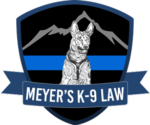Yes, with the possible exception of a marijuana case. There have been new cases that hold, in the context of marijuana, the alert of a K9 is only part of determining probable cause. The Colorado Supreme Court, in People v. McKnight (2019) 2019 CO 36, has departed from United States Supreme Court precedent in holding that law enforcement officers must have reasonable suspicion to believe that an item or area contains a drug in violation of state law before deploying a drug-detection dog that alerts to marijuana for an exploratory sniff. Colorado goes on to hold that even if a marijuana trained K9 dog alerts, the alert is only a factor in determining probable cause. This is in direct conflict with the United States Supreme Court. Colorado justified the departure by stating that since a marijuana trained K9 could be detecting “legal” activity (personal possession of marijuana) this transforms the “sniff” into a search which needs probable cause to justify it.
California, until recently, has been in line with the United States Supreme Court; if evidence of marijuana comes to light, LE had the right to continue to investigate to determine if the marijuana is legally possessed. People v. Waxler (2014) 224 Cal.App.4th 712. However, in People v. Lee (4th Dist. 2019) 40 Cal.App.5th 853, the court held that since California law now “expressly provides that legal cannabis and related products “are not contraband” and their possession and/or use “shall [not] constitute the basis for detention, search, or arrest,” the small amount of marijuana found was not probable cause to allow for a search. Contrast this with People v. McGee (2020) 53 Cal. App. 5th 796, where the court held the presence of an unsealed bag of marijuana (making possession illegal) plainly visible on an automobile passenger’s person constituted probable cause to search the purse, which contained a firearm. The court reasoned that the presence of this contraband provided probable cause to believe the passenger possessed other open containers. The search of the purse, as a compartment or container within the vehicle whose contents were not in plain view, was justified under the automobile exception. I
While Lee was not a K9 case, it has ramifications for K9 sniffs. LE can still use a marijuana trained K9 as California has not discounted a K9 alert altogether; rather, the courts seem to be limited the alert to a factor to be considered in determining probable cause. downgrading the alert from supplying probable cause in and of itself.
Therefore, it is critical to observe, document and articulate all the other reasons LE believes that subject is in possession of contraband (which includes marijuana in its illegal forms; too much, BHO lab components, other crimes committed, etc.). In addition, most K9s are trained to detect other controlled substances and LE knows from training and experience that most people who abuse drugs do not limit themselves to just one type of drug; most are poly-substance abusers. A handler in this situation does not know what the K9 is alerting on; the alert could be detecting any one of the many odors on which the K9 is trained. Be sure to note all additional information in your report that supports probable cause to search the vehicle other than a personal amount of marijuana.
